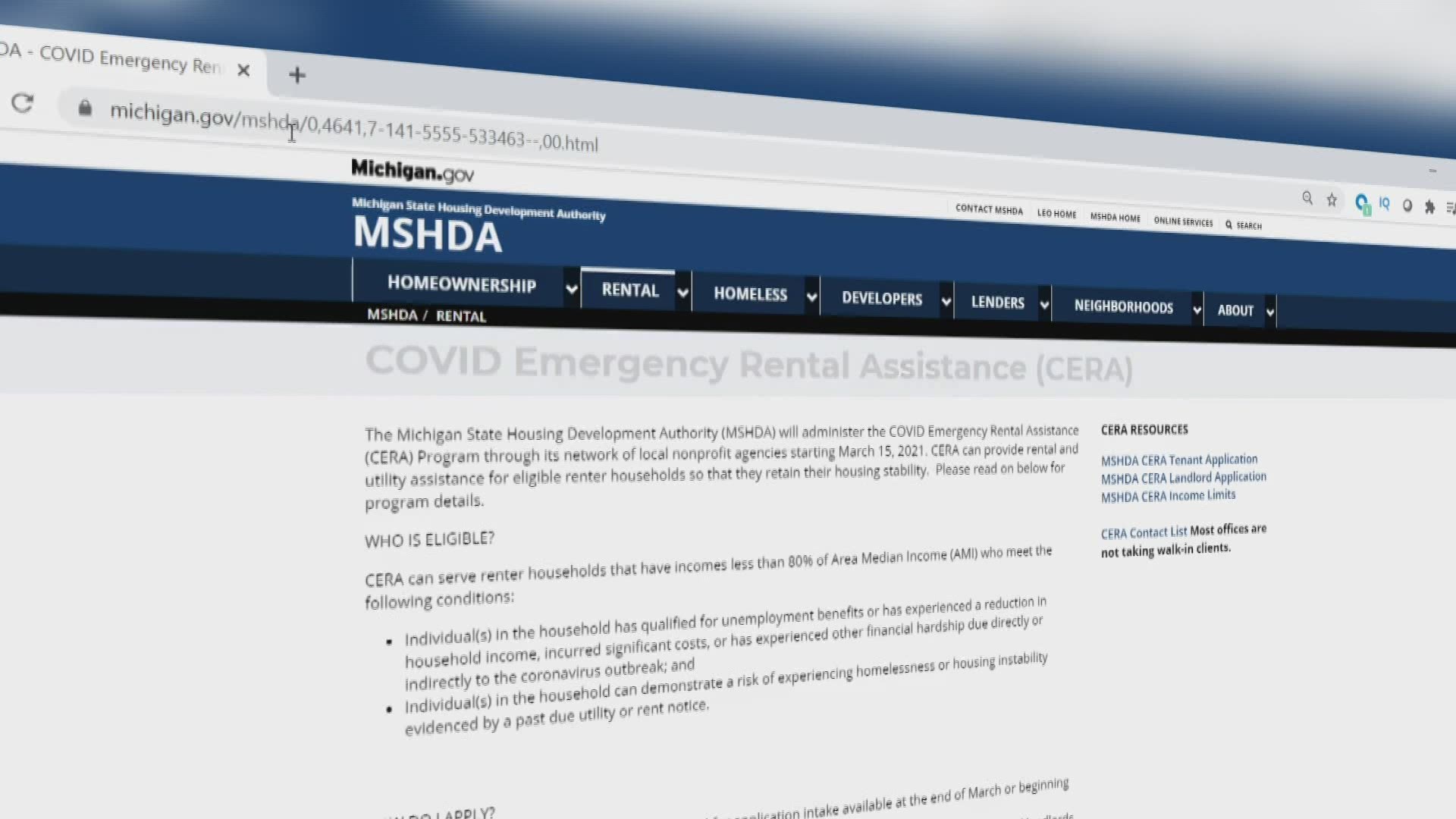On Monday, Michigan's housing authority announced the launch of a rent relief program that includes 10 times more dollars than a similar program launched last year.
The $622 million COVID Emergency Rental Assistance (CERA) program will replace the $62 million Eviction Diversion Program (EDP) launched last summer.
The CERA program can offer rent assistance for up to 12 months (based on income), which is longer than the EDP program offered, and it will also offer funds for utility payments and an internet stipend.
In order to qualify for the program, applicants must have a gross household income below 80% of the area median income (AMI) and be able to prove a COVID-related hardship, like unemployment or lost income.
The 'COVID-19 hardship' has to have occurred in the time since March 13, 2020.
"It doesn't have to be current, so they maybe had unemployment for a few months, you know, were out of work, but they've since regained employment they would still be qualified," said Kelly Rose, chief housing solutions officer with Michigan State Housing Development Authority (MSHDA).
The MSHDA based allocations to counties on eviction and homelessness data as well as population size.
Kent County received $38.5 million through CERA, in comparison to the $2.82 million it received last year through the EDP.
"It's significantly higher," said Kent County Community Action director Susan Cervantes. "Unfortunately, we'll have no problem spending it."
Cervantes said between several housing partners in the county, there are roughly 500 households awaiting rent relief currently.
Kent County Community Action and the Salvation Army along with several other partners will be administering the funds in Kent County.
MSHDA works with a network of nonprofits and district courts in each county to administer the funds and resolve eviction cases.
The priority in the initial rollout of the program will be people currently facing eviction, Rose said, as the eviction moratorium is set to expire at the end of the month.
"These first few weeks will really be focused on working with legal services in the district courts to try to make sure that as many eviction cases are handled and processed and paid upon," Rose said. "So that people aren't getting evicted in early April."
The CERA program currently has $282 million allocated with an additional $340 million expected to be appropriated soon.
Up to 10% of the allocated funds can go toward administrative costs.
In Kent County, 9% of the allocation will go toward administrative costs, which includes the hiring of 28 case managers to help applicants through the process, Cervantes said.
By the end of the year, the rent relief program will have had over a billion dollars, as an additional $500 million more is expected from the recently passed American Rescue Plan.
Rose said the MSHDA expects this money will last for about two years, though 65% of the funds must be used by the end of September.
"So, it's not something that people need to be super worried about that if they don't get their application in in the first month or two that we're going to be all out of money and they will have lost that opportunity," Rose said.
Rose said it's likely that 100,000 households will be served in total.
"We finally have enough money to fully meet the needs," Rose said of the program, which she says will also help landlords.
The program limit is 150% of the fair market rent based on your home size and county.
People who make up to 50% AMI can receive up to 12 months of assistance and three of those months can be future rent payments. If at that point an applicant can still not make rent, an additional three months of assistance can be requested (for a total of 15 months).
People who make 50-80% AMI will initially be offered 10 months of assistance, but can also receive an additional three months as needed.
Utility payments (i.e. electricity, heating, sewer and trash, water) are broken down by household size, but people who make up to 50% AMI are eligible for an additional $500 payment. A flat $300 internet stipend is available to households that include a recent bill in their application.
The application indicates that a state ID is needed, however, Rose said alternate IDs like a passport, green card or other government issued ID (does not have to be U.S. government) is acceptable. She said people's immigration status is not part of the application process and Social Security Number option is an optional field.
The state will be launching an online portal that will field all applications in the coming weeks. Paper applications are available at the local nonprofit agency in your county.
RELATED VIDEO
►Make it easy to keep up to date with more stories like this. Download the 13 ON YOUR SIDE app now.
Have a news tip? Email news@13onyourside.com, visit our Facebook page or Twitter. Subscribe to our YouTube channel.


